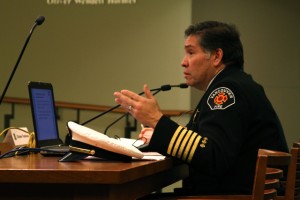Maintaining current levels of emergency medical services in Clark County will require a much more efficient, system-wide way of doing business.
That was the message Vancouver Fire Chief Joe Molina presented to the Vancouver City Council during a workshop Monday concerning a pending agreement between Emergency Medical Service (EMS) District #2 and private ambulance provider American Medical Response (AMR).
In 2004, AMR signed a six-year contract with EMS District #2, as well as interlocal agreements with the cities of Battle Ground, La Center, Ridgefield, and Vancouver. The contract allowed for three individually earned two-year extensions.
AMR earned two of the three extensions based on performance. However, during negotiations with EMS District #2 representatives in 2009 and 2010, AMR said any contract must address a dramatic decrease in ambulance revenues resulting from changes in Medicare reimbursements and an increase in the number of patients with little or no insurance who cannot pay for ambulnce services.
If approved by the Clark County Board of Commissioners today, the agreement will extend the window of ambulance arrival time by two minutes – from 7 minutes 59 seconds to 9 minutes 59 seconds – as long as Vancouver Fire and Rescue responders arrive on scene under the eight-minute window.
Molina said Vancouver’s Fire and Rescue paramedics are capable of delivering the same quality emergency care as AMR personnel, but the extra two-minute cushion will allow AMR to realize greater savings through more efficient scheduling and staff distribution.“Right now we are not looking to alter the service level of the patient at critical levels,” Molina said. “This is just a change that allows us to use our services better – using our paramedics they will look further into the patient care protocol.”
Of Vancouver Fire and Rescue’s 12 units, nine must be staffed with a paramedic at any one time. A crew with a paramedic can provide Advanced Life Support (ALS), while a crew without a paramdedic can offer only Basic Life Support (BLS).
Doug Smith-Lee, EMS manager at Clark Regional Emergency Services Agency (CRESA), says the extra two minutes doesn’t mean that AMR ambulances will take their time in arriving to a scene. Rather, it’s a contractual devise that will lead to using resources more efficiently on the whole.
“The goal is ALS in 7 minutes 59 seconds. Whether it’s a transport capable unit provided by the ambulance contractor or a first responder or ambulance, we don’t want to compromise the time critical patients,” Smith-Lee said.
Council questions response time request
Even while acknowledging the harsh economic realities AMR faces, City Council members didn’t like the idea of a change in protocol.
Councilor Jeanne Harris said that since Vancouver Fire and Rescue doesn’t have a paramedic with every unit, it can’t guarantee advanced medical care in every case if ambulances are delayed. She would rather find out what it costs to pay AMR what it needs to arrive in 7 minutes 59 seconds rather than have the city make up the difference with Fire and Rescue doing the job that the ambulance crews would otherwise do.
“That’s a problem for me,” she said. “I’m all for dynamic scheduling, whatever it takes to provide a system that makes sense, but this doesn’t make sense to me. The two minutes is not covered. We should have asked what does it cost to get those two minutes. We’re stuck with the service level and we’ll eventually be stuck with the cost.”
Council member Jeanne Stewart said that being able to determine the severity of an emergency depends upon the accuracy of someone who initially calls 911. She wanted to know more about prioritizing calls so a Fire and Rescue unit is not caught unprepared if it needs to provide ALS.
Molina said that there is always an element of risk, but that every call is treated as a priority 1. Filtering out the non-emergency calls is the challenge.
“This isn’t bulletproof, but what we have is not bulletproof,” he said.
Councilor Jack Burkman said this is yet another example of the federal government pulling back its funding (via Medicare) and putting the onus of responsibility on local jurisdictions.
“This is another example of fewer federal dollars and we have to make up the difference,” he said.
Harris raised the question of whether it was worth continuing with a public-private partnership if Vancouver Fire was doing so much of the work. She asked why couldn’t the Fire and Rescue crews assume responsibility of transporting patients as well?
Molina said there is no revenue in transport, but this new agreement would essentially be a test drive of a new system that would target inefficient care.
“We have to have a high degree of coordination to ensure that we are not doing redundant triage on scene,” said Molina.
Lack of integration between current fire and ambulance systems
David Fuller, general manager of AMR, said that despite what people may assume, the fire and ambulance systems aren’t integrated at all. Dispatchers can’t look at a screen and see where ambulances are in relation to Vancouver first responders. He said this agreement is a move toward a single system, rather than dual systems where there may be overlap in service.
“Since the systems aren’t currently coordinated, then there is some redundancy that happens, whereas if we are coordinated and we’re communicating then I can shift my locations and staffing so we’re actually providing better coverage through the community as a whole by utilizing all of the ALS responders and not just the ambulance responders,” Fuller said. “For the first time, really, we’ve been able to have very open discussions about integration, making sure that we’re being as efficient as possible in actually developing an EMS system versus a fire first response system and an ambulance first response system.”
If approved by commissioners, the agreement will take effect immediately. The cities and fire districts within EMS District #1 and those that had previously signed Interlocal agreements will then have the option of signing on.
If they don’t, the two-minute extension will not be applied within that particular jurisdiction. Since Vancouver makes up 80 percent of the service area, Fuller said that if the City Council opts not to sign the agreement, realizing cost savings will be that much harder.
“It doesn’t mean we can’t gain more efficiencies, it just makes it more challenging,” he said.










